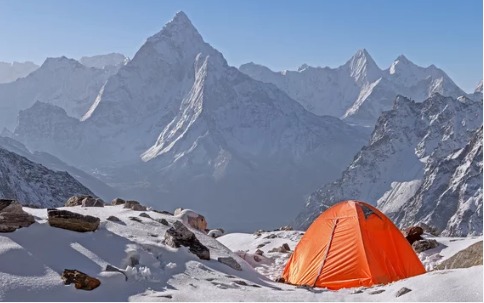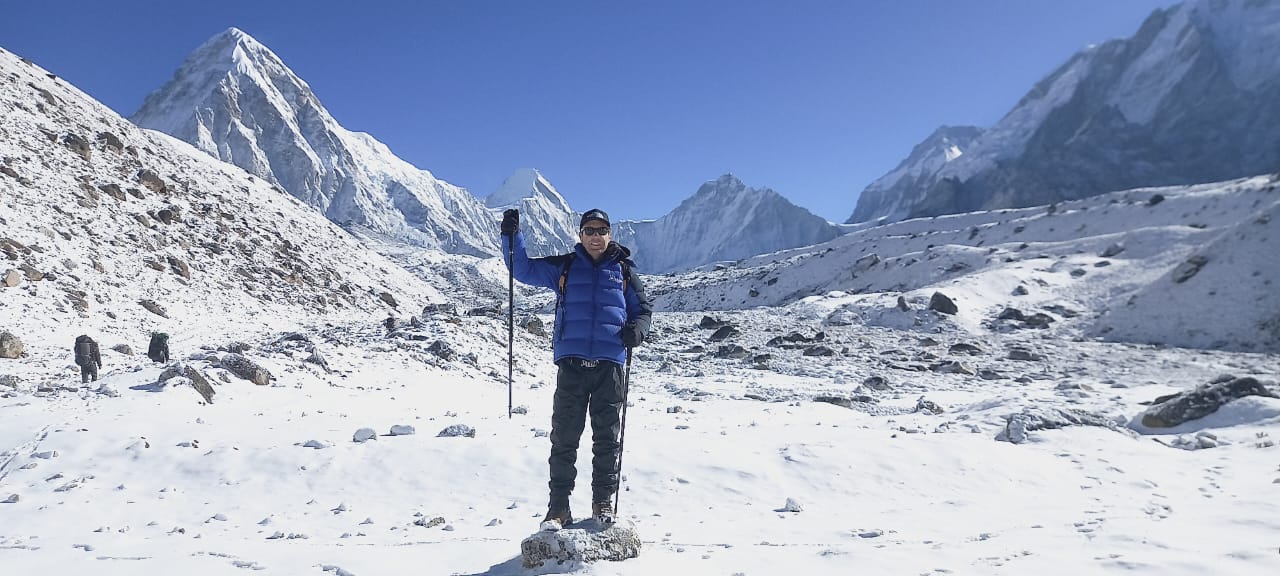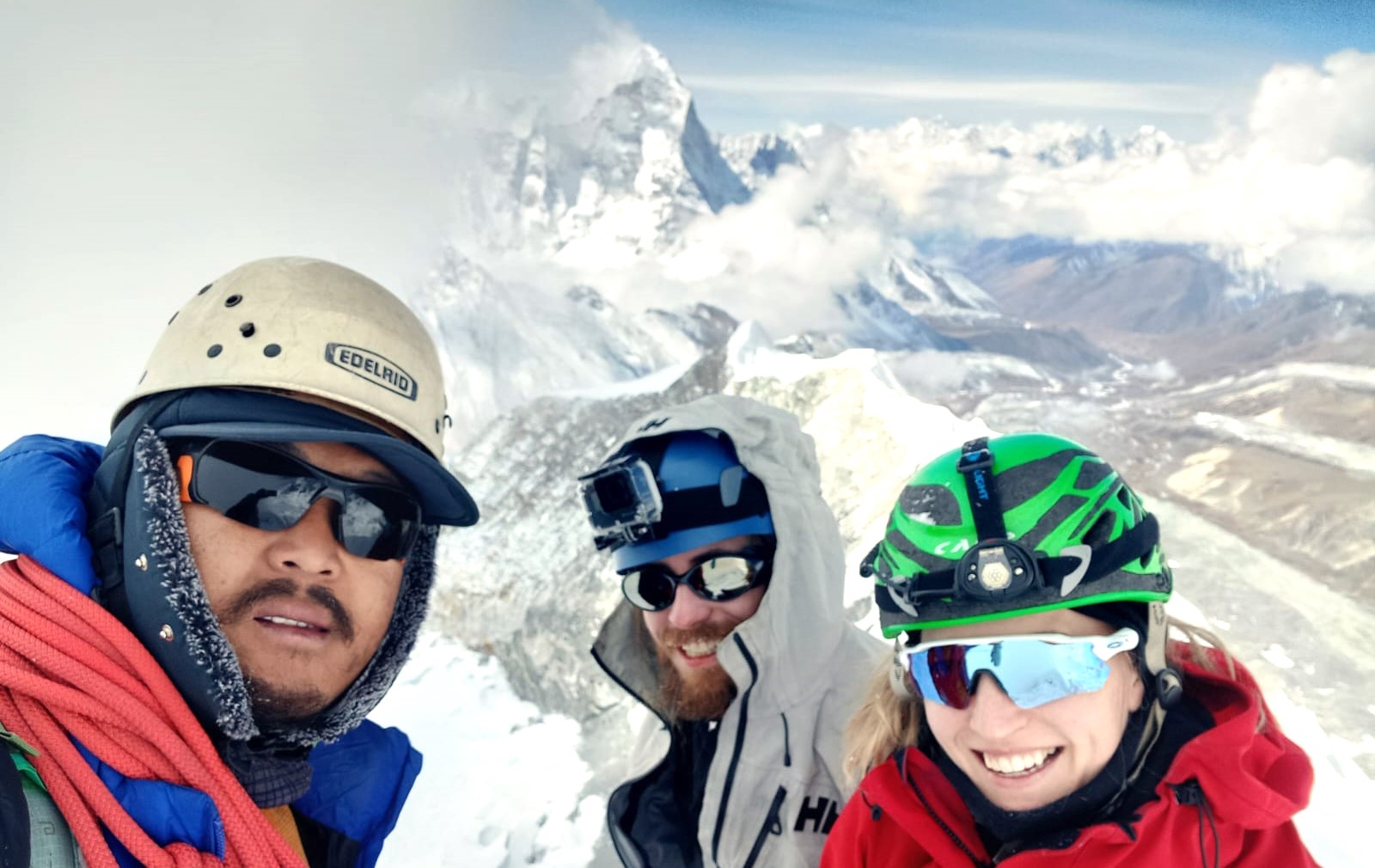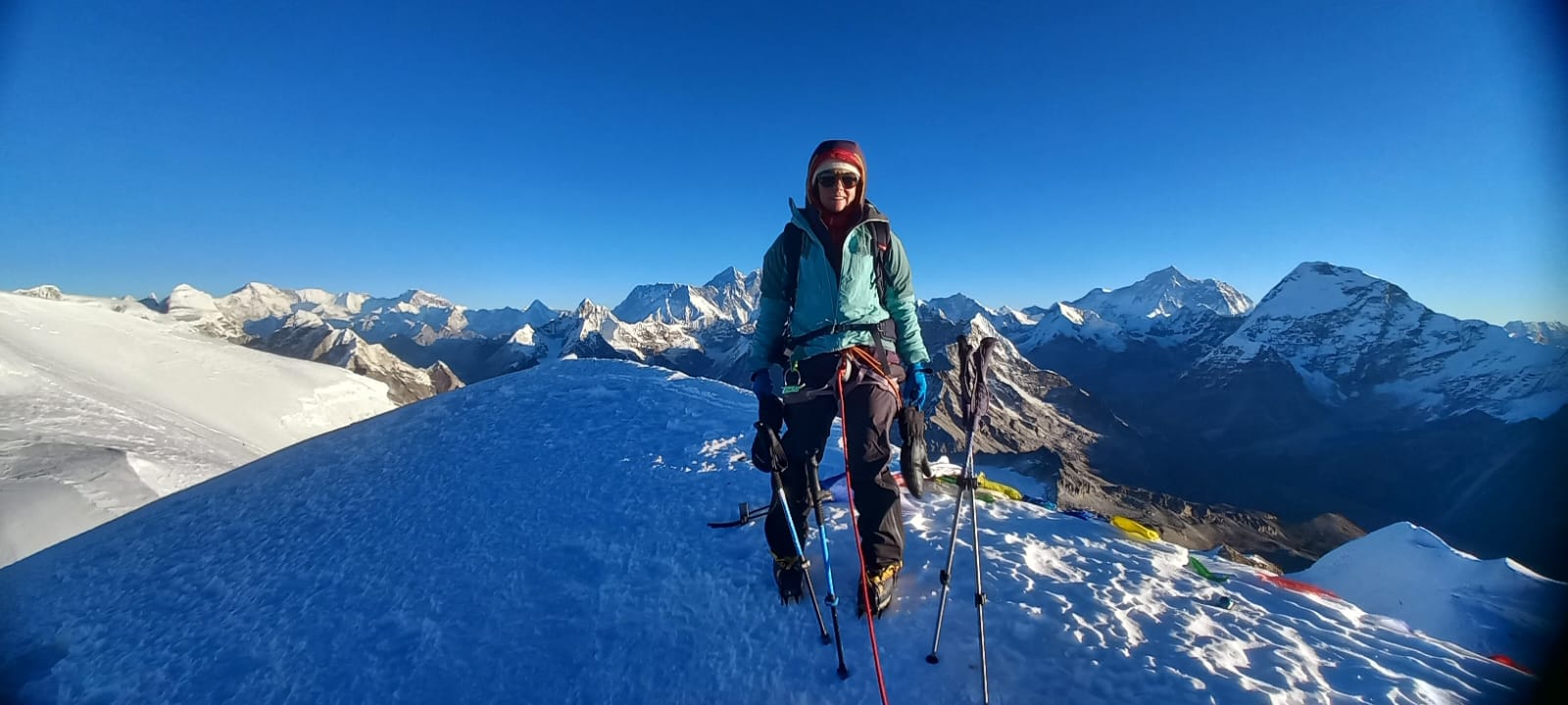26th August, 2025

May 22, 2024
Island Peak Climbing In August
- Why Island Peak in August
- I Never Climbed a Mountain, Can I Climb Island Peak?
- Packing Lists for Island Peak Climbing for August
- Training for Island Peak in August
- Weather, Climate, and Temperature in Island Peak in August
- Solo Climbing to Island Peak
- Is Island Peak Dangerous in August?
- I am a Beginner Climber, Can I Do This Climb?
- How Hard is the Climb of Island Peak?
- Distance of Island Peak
- Final Say
- Island Peak Climbing Packages
Island Peak, also known as Imja Tse, stands as an iconic peak in the Everest region of Nepal, offering a challenging yet accessible climbing experience suitable for adventurers with basic mountaineering skills. Climbing Island Peak in August presents a unique opportunity amidst the lush monsoon season, where the landscapes are vibrant with greenery, and the air is crisp and clear after rain showers.
August marks the tail end of the monsoon in Nepal, bringing occasional rain showers and mist that add a mystical ambiance to the already breathtaking surroundings. The journey to Island Peak begins with a scenic flight from Kathmandu to Lukla, followed by a trek through verdant forests, picturesque Sherpa villages, and across suspension bridges spanning roaring rivers fed by monsoon rains.
As climbers ascend higher into the Khumbu region, the trail reveals stunning views of towering peaks like Ama Dablam and Thamserku, gradually leading to the base camp of Island Peak. Nestled amidst rugged terrain and surrounded by snow-capped summits, the base camp serves as a strategic point for acclimatization and preparation.

ISLAND PEAK CLIMBING
Sherpa Expedition & Trekking (Est.1977) are pleased to announce FOR ADVENTURERS the most awesome, exhilarating & unforgettable climbing and treks on offer anywhere today!...
The climb itself requires technical proficiency in using crampons, ice axes, and ropes, making it an ideal step up from trekking to more advanced mountaineering. Experienced Sherpa guides, trained in high-altitude rescue and safety techniques, accompany climbers every step of the way, ensuring a safe and memorable ascent.
The summit day typically starts before dawn, with headlamps piercing through the darkness as climbers navigate the glaciated slopes. As the sun rises, it casts a golden glow over the vast Himalayan panorama, rewarding climbers with breathtaking views of Everest, Lhotse, and Makalu from the summit of Island Peak.
Descending back to base camp and retracing the trail through the Everest region allows climbers to reflect on their achievement amidst some of the world's most awe-inspiring landscapes. The journey concludes with a celebratory return to Lukla and a flight back to Kathmandu, where memories of conquering Island Peak in August linger as a testament to both personal accomplishment and the allure of Nepal's Himalayas during the monsoon season.
Why Island Peak in August
Choosing to climb Island Peak in August offers a unique adventure amidst Nepal's monsoon season. Despite occasional rain showers, August presents lush green landscapes and clear skies post-rain, enhancing the natural beauty of the Everest region. The trails are less crowded compared to peak seasons, providing a more intimate experience with nature and local culture. Climbing in August also offers a chance to witness spectacular views of snow-capped peaks in their pristine state after rainfall, making every step towards the summit a visual delight.
I Never Climbed a Mountain, Can I Climb Island Peak?
While climbing Island Peak requires basic mountaineering skills, it is achievable for beginners with proper preparation and guidance. Prior trekking experience in high-altitude environments is beneficial but not mandatory. Enrolling in a reputable guiding service ensures adequate training in technical skills like using crampons and ropes. Guides also assist in acclimatization, crucial for adjusting to high altitudes. With determination and guidance from experienced Sherpa guides, novice climbers can successfully conquer Island Peak, turning their first mountain climb into a memorable achievement.
Packing Lists for Island Peak Climbing for August
Packing for Island Peak in August requires careful consideration due to varying weather conditions. Essential items include waterproof clothing, sturdy trekking boots, insulated layers, a sleeping bag suitable for cold nights, and a high-quality backpack. Additionally, pack sun protection gear like sunglasses, sunscreen, and a wide-brimmed hat to shield against UV rays. Bring a headlamp for early morning starts and spare batteries. Don't forget personal items such as toiletries, medications, and a camera to capture the stunning landscapes. Check with your tour operator for specific gear requirements and rental options to lighten your load.

ISLAND PEAK SUMMIT RETURN BY HELICOPTER
Many of us only dream of standing on a tall peak looking down on the world. This is a great climb that will satisfy this desire. Island Peak, also referred to as Imja Tse, is a 6187-meter high peak in...
Training for Island Peak in August
Preparing for Island Peak involves a mix of cardiovascular exercises, strength training, and altitude simulation. Focus on aerobic activities like hiking, running, and cycling to build endurance. Strengthen leg muscles with squats, lunges, and stair climbing to handle steep ascents. Practice using mountaineering gear like crampons and ice axes under expert supervision. Acclimatization hikes at high altitudes help your body adjust to reduced oxygen levels. Mental preparation is equally vital; practice mindfulness and resilience to tackle challenges on the climb. A well-rounded training regimen ensures you're physically and mentally prepared for the demands of Island Peak in August.
Weather, Climate, and Temperature in Island Peak in August
August in Island Peak experiences the tail end of Nepal's monsoon season, characterized by occasional rain showers and mist. Daytime temperatures range from 5°C to 15°C (41°F to 59°F) at lower altitudes, while nights can drop to -5°C to 5°C (23°F to 41°F). Higher up, temperatures are colder, and weather conditions can change rapidly. Fog and cloud cover are common, clearing after rain showers to reveal stunning mountain views. Prepare for variable weather by packing waterproof clothing, insulated layers, and gear suitable for cold and wet conditions. Consult with local guides for up-to-date weather forecasts and safety precautions.
Solo Climbing to Island Peak
Solo climbing Island Peak is feasible with prior mountaineering experience, although it's recommended to go with a guided group for safety and support. Experienced climbers comfortable with technical ascents, crevasse navigation, and high-altitude conditions can attempt solo climbs. However, even experienced climbers benefit from local knowledge and logistical support provided by Sherpa guides and support staff. Solo climbers should have comprehensive mountaineering skills, proper gear, emergency communication devices, and a detailed itinerary. Respect local regulations and guidelines, ensuring safety and minimal environmental impact. Whether solo or with a group, Island Peak promises an exhilarating adventure amidst Nepal's stunning Himalayan landscape in August.
Is Island Peak Dangerous in August?
Climbing Island Peak in August presents certain challenges due to the monsoon season in Nepal. While the weather can be unpredictable with occasional rain showers and cloud cover, experienced guides mitigate risks by monitoring weather conditions closely. The main hazards include slippery trails and potential rockfalls, especially after rain. However, with proper preparation, including acclimatization and using appropriate gear, the climb remains safe for those with basic mountaineering skills. Choosing a reputable guiding service with experienced Sherpas enhances safety and ensures a well-planned ascent, minimizing potential dangers.

ISLAND AND LOBUCHE PEAK CLIMBING
Lobuche and Island Peak combo climbing expedition is a thrilling adventure that offers a unique opportunity to conquer two popular peaks in the Everest region of Nepal. Lobuche Peak (6,119m) and Islan...
I am a Beginner Climber, Can I Do This Climb?
Island Peak is technically challenging but achievable for beginner climbers with proper training and guidance. Prior trekking experience in high-altitude environments is beneficial but not mandatory. Joining a guided expedition ensures learning essential mountaineering skills such as using crampons, ice axes, and ropes under expert supervision. The climb requires physical fitness, endurance, and mental resilience to handle steep ascents and high altitudes. Sherpa guides provide support throughout the journey, ensuring safety and assistance in challenging sections. With determination and preparation, beginners can successfully conquer Island Peak, turning their aspiration into a rewarding accomplishment amidst Nepal's majestic Himalayas.
How Hard is the Climb of Island Peak?
Island Peak presents a moderately challenging climb suitable for climbers with basic mountaineering experience. The ascent includes technical sections such as using fixed ropes and crossing crevasses, requiring familiarity with crampon and ice axe techniques. The altitude, reaching over 6,000 meters (20,000 feet), adds to the challenge, necessitating proper acclimatization. The climb involves steep ascents on mixed terrain, ranging from rocky trails to glaciated slopes. Despite its challenges, Island Peak's popularity stems from its accessibility to intermediate climbers seeking to advance their mountaineering skills. With proper training, guidance from experienced Sherpa guides, and adherence to safety protocols, climbers can overcome the climb's difficulties and enjoy breathtaking views from the summit.
Distance of Island Peak
Island Peak is located in the Everest region of Nepal, northeast of Kathmandu. The journey typically begins with a scenic flight from Kathmandu to Lukla, followed by a trek through picturesque Sherpa villages and rugged landscapes. The trekking distance to Island Peak's base camp varies depending on the chosen route but generally covers approximately 70-80 kilometers (43-50 miles) round-trip from Lukla. The trek involves ascending and descending through diverse terrain, including forests, moraines, and glacier-covered paths. The final push to the summit from base camp is a challenging climb, typically completed over a few days. The distance and terrain make Island Peak a rewarding adventure for climbers seeking to explore Nepal's Himalayan wilderness and conquer a notable peak in the Everest region.

ISLAND PEAK EXPEDITION 15 DAYS
Island Peak, also known as Imja Tse, is a popular peak located in the Khumbu region of Nepal. This peak is a part of the Himalayas and stands tall at a height of 6,189 meters above sea level. Island P...
Final Say
Climbing Island Peak in August offers a thrilling adventure amidst Nepal's monsoon season, presenting both challenges and rewards for adventurers. While the weather can be unpredictable with occasional rain and mist, experienced guides ensure safety and manage risks effectively. Beginners with determination and proper training can successfully conquer Island Peak, supported by expert Sherpa guidance. The climb is moderately challenging, requiring basic mountaineering skills and physical fitness to navigate steep ascents and high altitudes. Island Peak's location in the Everest region offers stunning views and a memorable experience for climbers. With careful planning and preparation, Island Peak stands as an achievable goal, promising an unforgettable journey amidst Nepal's majestic Himalayas.
Island Peak Climbing Packages
Island Peak Summit Return By Helicopter
Island Peak Expedition 14 Days
Island Peak Expedition 15 Days
Everest Three Pass with Island Peak Climbing

Three Peak Expedition
Embark on an unforgettable journey to the heart of the Himalayas as you conquer three majestic peaks: Mera Peak, Island Peak, and Lobuche Peak. This ultimate adventure combines technical climbing, bre...
Any Questions? Let Us Know.
Recent Posts
17th June, 2025


















